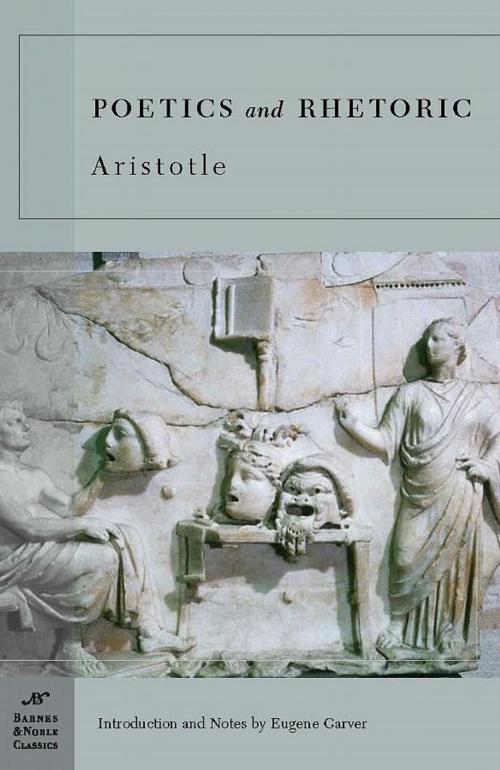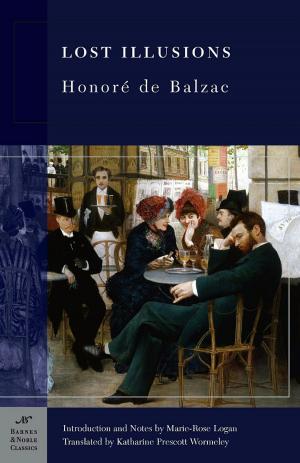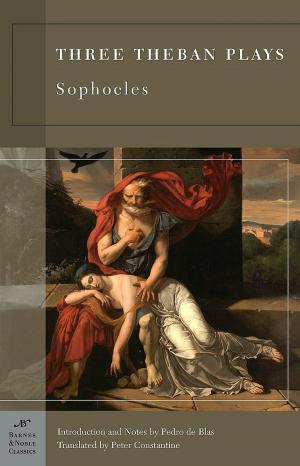Poetics and Rhetoric (Barnes & Noble Classics Series)
Fiction & Literature, Literary Theory & Criticism, Ancient & Classical, Nonfiction, Religion & Spirituality, Philosophy, Classics| Author: | Aristotle, Eugene Garver | ISBN: | 9781411432932 |
| Publisher: | Barnes & Noble Classics | Publication: | June 1, 2009 |
| Imprint: | Barnes & Noble Classics | Language: | English |
| Author: | Aristotle, Eugene Garver |
| ISBN: | 9781411432932 |
| Publisher: | Barnes & Noble Classics |
| Publication: | June 1, 2009 |
| Imprint: | Barnes & Noble Classics |
| Language: | English |
Poetics and Rhetoric, by Aristotle, is part of the Barnes & Noble Classics* *series, which offers quality editions at affordable prices to the student and the general reader, including new scholarship, thoughtful design, and pages of carefully crafted extras. Here are some of the remarkable features of Barnes & Noble Classics:
- New introductions commissioned from today's top writers and scholars
- Biographies of the authors
- Chronologies of contemporary historical, biographical, and cultural events
- Footnotes and endnotes
- Selective discussions of imitations, parodies, poems, books, plays, paintings, operas, statuary, and films inspired by the work
- Comments by other famous authors
- Study questions to challenge the reader's viewpoints and expectations
- Bibliographies for further reading
- Indices & Glossaries, when appropriate
All editions are beautifully designed and are printed to superior specifications; some include illustrations of historical interest. Barnes & Noble Classics pulls together a constellation of influences—biographical, historical, and literary—to enrich each reader's understanding of these enduring works.
It is no exaggeration to say that all Western literary criticism flows from Aristotle. In the Poetics he focuses mainly on drama, especially tragedy, and introduces ideas that are still being debated more than two thousand years later. Among them is the often misunderstood theory of the unities of action, place, and time, as well as such concepts as: art as a form of imitation, and drama as an imitation of human actions; plot as a drama’s central element, and “reversal” and “recognition” as important elements within a plot; and the purging of pity and fear from the audience as the function of tragedy. Rather than offer these ideas merely as abstract theories, Aristotle applies them in cogent analyses of the classic Greek dramas—the tragedies of Aeschylus, Sophocles, and Euripides.
In the Rhetoric, Aristotle turns to the principles of persuasive writing, including argumentation and the logical development of proof, appeals to emotion, and matters of delivery and style. Perhaps most essentially, Aristotle teaches us how to engage in the central civic activities of accusing and defending, recommending policies, and proving and refuting ideas.
These two foundational works are key documents for understanding the culture and politics of Western civilization, and how they continue to evolve today.
Eugene Garver is Regents Professor of Philosophy at Saint John’s University, Collegeville, Minnesota. He is the author of Machiavelli and the History of Prudence, Aristotle’s Rhetoric: An Art of Character, For the Sake of Argument: Practical Reasoning, Character, and the Ethics of Belief, and the forthcoming Living with Thought: A Confrontation with Aristotle’s Ethics.
Poetics and Rhetoric, by Aristotle, is part of the Barnes & Noble Classics* *series, which offers quality editions at affordable prices to the student and the general reader, including new scholarship, thoughtful design, and pages of carefully crafted extras. Here are some of the remarkable features of Barnes & Noble Classics:
- New introductions commissioned from today's top writers and scholars
- Biographies of the authors
- Chronologies of contemporary historical, biographical, and cultural events
- Footnotes and endnotes
- Selective discussions of imitations, parodies, poems, books, plays, paintings, operas, statuary, and films inspired by the work
- Comments by other famous authors
- Study questions to challenge the reader's viewpoints and expectations
- Bibliographies for further reading
- Indices & Glossaries, when appropriate
All editions are beautifully designed and are printed to superior specifications; some include illustrations of historical interest. Barnes & Noble Classics pulls together a constellation of influences—biographical, historical, and literary—to enrich each reader's understanding of these enduring works.
It is no exaggeration to say that all Western literary criticism flows from Aristotle. In the Poetics he focuses mainly on drama, especially tragedy, and introduces ideas that are still being debated more than two thousand years later. Among them is the often misunderstood theory of the unities of action, place, and time, as well as such concepts as: art as a form of imitation, and drama as an imitation of human actions; plot as a drama’s central element, and “reversal” and “recognition” as important elements within a plot; and the purging of pity and fear from the audience as the function of tragedy. Rather than offer these ideas merely as abstract theories, Aristotle applies them in cogent analyses of the classic Greek dramas—the tragedies of Aeschylus, Sophocles, and Euripides.
In the Rhetoric, Aristotle turns to the principles of persuasive writing, including argumentation and the logical development of proof, appeals to emotion, and matters of delivery and style. Perhaps most essentially, Aristotle teaches us how to engage in the central civic activities of accusing and defending, recommending policies, and proving and refuting ideas.
These two foundational works are key documents for understanding the culture and politics of Western civilization, and how they continue to evolve today.
Eugene Garver is Regents Professor of Philosophy at Saint John’s University, Collegeville, Minnesota. He is the author of Machiavelli and the History of Prudence, Aristotle’s Rhetoric: An Art of Character, For the Sake of Argument: Practical Reasoning, Character, and the Ethics of Belief, and the forthcoming Living with Thought: A Confrontation with Aristotle’s Ethics.















